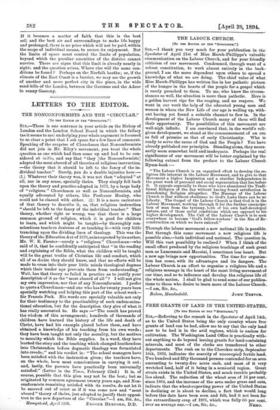LETTERS TO THE EDITOR.
THE NONCONFORMISTS AND THE "CIRCULAR."
rro THE EDITOR OF THE "SPECTATOR."] SIR,—There is one sentence in your article on the Bishop of London and the London School Board in which the fallacy (as it seems to me) underlying your whole argument is focussed to so clear a point that I ask space for a few lines of comment. Speaking of the surprise of Churchmen that Nonconformists did not join in Mr. Riley's movement, you treat the whole question as one which had then come up and had to be con- sidered ab initio, and say that "they [the Nonconformists] adopted the most absurd of all theories of religious instruction, —the theory that it should be left to the fancy of the in- dividual teacher." Surely, you do a double injustice here :— (1.) Whatever their theory was, it was not then " adopted" at all, nor in any sense, specially theirs. They simply fell back upon the theory and practice adopted in 1871, by a large body of "religious " Churchmen as well as Nonconformists, and equally advocated by others, like Professor Huxley, who could not be classed with either. (2.) It is a mere caricature of that theory to describe it, as, that religious instruction "should be left to the fancy of the individual teacher." That theory, whether right or wrong, was that there is a large common ground of religion, which it is good for children to learn, and which might be taught—by thoroughly con- scientious teachers desirous of so teaching it—with very little trenching upon the dividing lines of theology. This was the theory of the Education Act of 1870, as interpreted by its author, Mr. W. E. Forster—surely a " religious " Churchman—who said of it, that he confidently anticipated that " in the reading and explaining of the Bible, what the children will be taught will be the great truths of Christian life and conduct, which all of us desire they should know, and that no efforts will be made to cram into their poor little minds theological dogmas which their tender age prevents them from understanding." Well, has that theory so failed in practice as to justify your description of it as the " most absurd of all "? I will not give my own impression, nor that of any Nonconformist. I prefer to quote a Churchman—and one who has for twenty years been specially watching and helping this part of the school work— Sir Francis Peek. His words are specially valuable not only for their testimony to the practicability of such undenomina- tiona1 education, but for the description they give of what it has really amounted to. He says :—" The result has proved the wisdom of this arrangement; hundreds of thousands of children.. have learned the history of the life and death of Christ, haVe had his example placed before them, and have obtained a knowledge of his teaching from his own words ; they have been taught not only the morality, but the motives to morality which the Bible supplies. In a word, they have learned the story and the teaching which changed heathendom into Christendom before dogmatic theology was formulated into Creeds; " and his verdict is : " The school managers have been satisfied with the instruction given ; the teachers have, on the whole, been most conscientious in carrying it out ; and, lastly, the parents have practically been universally satisfied." (Letter in the Times, February 22nd.) It is, of course, possible that this plan may not be the best; but so originated by common agreement twenty years ago, and Non- conformists remaining satisfied with its results, do not let it be sneered out of court as if it was some new and "most absurd" theory of theirs, just adopted to justify their opposi- tion to the new departure of the " Circular."—I am, Sir, &c.,


















































 Previous page
Previous page